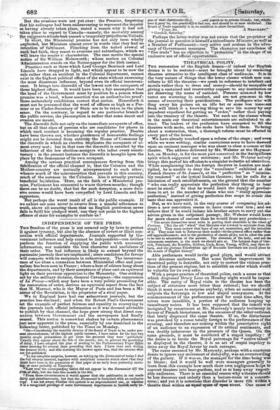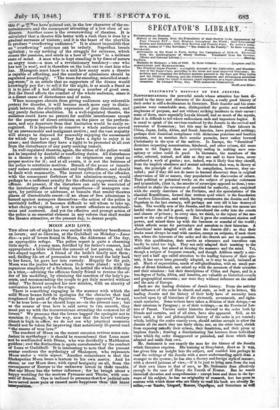THEATRICAL POLITY.
THE restoration of the English drama—if indeed the -English drama is to be restored—must be brought about by rendering theatres attractive to the intelligent class of audiences. It is in the very nature of things that the lower classes which now con- tribute to -fill the theatres—we speak in reference to intellect and morals rather than to dress and money—should be incapable of giving a sustained and trustworthy support to any institution or art deserving the name of national. Persons actuated by lose tastes are wavering in conduct, and are not generous in the means of securing -their gratifications. The profligate who will fling away his guinea on an idle bet or some less innocent freak will think it a knowing thing to save his money by any impudent expedient for getting an order," rather than paying into the treasury of the theatre. Yet such are the classes whom in the main our theatrical entertainments are calculated to at- tract. The leaders of the profession have competed to fill the theatres with mobs, and the mobs have bilked. them. To bring about a restoration, -then, a thorough reform must be effected in every part of the house. We have already touched upon a reform of -the stage ; and even while we were writing, similar convictions seem to have dawned upon an eminent manager who was about to close a season at his theatre. The address delivered by Mr. Webster at the Haymar- ket, on Monday, is for the most part conceived in the Antigallican spirit which suggested our strictures ; and Mr. Webster naively brings this part of his effusion to a singular reductio ad absurdum. While complaining' that the foreign theatres in London are mul- tiplied, he is unable to deny the "excellence" exhibited at the French theatre of St. James's, or the " perfection " so " inimita- bly rendered" at the lyrical Italian theatres; but he calls for a limitation of such establishments, on the ground that the number ".who can. really appreciate the perfection they throng to hear must be small." So that he would limit the supply of produc- tions in art to the number of those who can "really appreciate perfection," instead of giving perfection free scope to create the taste that can appreciate it.
But, as we have said, in the very course of composing his ad- dress a new conviction seems to have come over him ; and we believe that if he could induce his brother actors to carry out the advice given in the subjoined passage, Mr. Webster would have far more chance of success than he would from any protection-
" The actors themselves must unite in putting their shoulders to the wheel of Fortune. [Not the old "wheel' that Hercules was invoked to extricate from the slough!] They must eschew that bane of oar art, mannerism, and the imitation of it. They must look to Nature as their model—tothe general effect rather than self-aggrandizement; and in the production of classic plays, not to allow the poet to be lost in admiration of the painter. The elevation of the body, and not its extraneous members, is the mark we should aim at. The halcyon days of Gar- rick, Pritchard, the Kembles, Siddons,Cook, }tear], Young, may then re- turn,and the glorious Elizsbethan age o'? dramatic literature net stand alone in • the annals of English history."
Able performers would invite good plays, and would -attract more decorous Audiences. But some further improvement in theatrical polity is desirable, not only to correct the vicious prac- tices of the present regime, but to establish an order which would be valuable for its own sake.
With a proper practice of theatrical police, such a scene as that Which disgraced Drury Lane on Monday night would be impos- sible. The rarity of Royal visits to the theatre has been the subject of strictures more bitter than rational; but we should think it must cease to surprise anybody, when an occasional visit subjects the Sovereign to low and stupid annoyances. At the commencement Of the performance and for some time after, the actors were inaudible, a portion of the audience keeping up tnmultuary noises. It has been supposed that the tumult was instigated by resentment at Mr. Macready's manly testimony in favour of French bienseance, on the occasion of the other outbreak that lately disgraced the same theatre. If so, the disturbance was provoked by a cause totally foreign to the performance of the evenmg, and therefore not coming within the 'prescriptive right of an audience to an expression of its critical sentiments, and was doubly indecorous in the presence of the Queen. On the same grounds, it must be convicted of a stupid impolicy : if the desire is to invite the Royal patronage for "native talent" as displayed in the theatre, it is an act of stupid impolicy to drive away the Royal favour by such outrages.
The cause assumed by Mr. Macready, perhaps with a courteous desire to ignore any movement of disloyalty, was an overcrowding of the gallery. If it was so, the manager for the time being was to blame ; and it would be well were managers generally to learn from this example how much their own negligence helps to convert theatres into bear-gardens, and so to keep away respect- able audiences. There is no essential reason why a theatre should be less decorous and orderly than a lecture-room or a concert- room ; and yet it is notorious that disorder is more rife within .a theatre than within anytime space of open street. One cause of this e' 10-t14.ve have pointed out, in the low character of the en- tertainments and the consequent attracting of a low class of au- diences. Another cause is the overcrowding of theatres. It is calculated that a theatre fills better with a rush than it does by a gradual entrance of visiters ; and it is the boast of the playbills to produce "overflowing audiences." It is almost impossible that an "overflowing" " audience can be orderly. Superflux breeds agitation ; to say nothing of the struggle for entrance, which rouses the passions, and sends in a host of "gents" in a militant state of mind. A man who is kept standing is by force of nature an angry man—a man of a revolutionary tendency—one who has not [a seat], and is therefore on the look-out to oust him who has. Managers must know to a unit how many seats a theatre is capable of affording, and the number of admissions should be regulated accordingly. "The room for standing, miscalled stand- ing-room," is an article that no supporters of the drama would knowingly pay fur : to sell it for the night, is as much a fraud as it is to pass off a bad shilling among a number of good ones. But the fraud affects the comfort of the whole audience, since it is a direct cause of disturbance and of noise.
When managers abstain from giving audiences any colourable pretext for disorder, it will become much more easy to distin- guish between the allowable expression of just discontent, and any purely factious ebullition. In a well-regulated theatre, the audience could have no pretext for audible interference except for the purpose of direct criticism on the piece or the perform- ance, and any departure from that limitation would be easily re- cognized. It is impossible to conceive a whole audience moved by an unreasonable and malignant motive ; and the vast majority will always be disposed for peaceably enjoying the amusement for which they have paid. They have a right to enjoy it in peace ; and therefore they have a right to be protected at all cost from the disturbance of any party seeking tumult.
In well-regulated theatres, again, the action of the police would not be impeded by doubtful or conflicting duties. All disturbance in a theatre is a public offence : its originators can plead no proper motive for it ; and at all events, it is not the business of the police to scrutinize motives. Breach of the peace or tumult- uary noises constitute a manifest and tangible offence, and should be dealt with summarily. The instant extrusion of the offender, with the consequent forfeiture of his admission-money, would perhaps be a sufficient penalty for the effectual suppression of the offence. At present, if the disturbers can only be convicted of the involuntary offence of being superfluous—if managers con- nive, by petitions or addresses at tumults that render theatres places of discreditable resort—if an abuse of free admissions is turned against managers themselves—the action of the police is inevitably baffled ; it becomes difficult to tell whom to take up, what charge to register, or how to arrest offenders so multitudi- nous and scattered. And yet the effective and prompt action of the police is an essential element in any reform that shall render the theatre attractive, at the present day, to decent people.



























 Previous page
Previous page